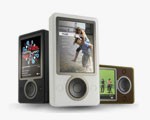San Francisco — All the Google Android hype just might be true: For those of you longing for the so-called Google Phone as if it were the next iPhone, the wait is almost over. T-Mobile USA on Tuesday revealed plans to unveil the much-anticipated “Gphone,” a wireless phone based on Google Inc.’s Android software next Tuesday at a press conference in New York.
The “G1,” handset manufactured by HTC, which will hit the stores in October, promises to reinvigorate the smartphone market and provide a mobile application platform to rival Apple’s iPhone. T-Mobile is expected to finally divulge some key details such as pricing. Regardless of all the talk of delays, then, that date would put Android right on target with its initial timetable.
T-Mobile is currently the first carrier to promote the phone. Other mobile phone manufacturers and carriers are likely to dial for dollars using the Google brand as bait, but they apparently have hit some snags. The Android phone is being positioned as a rival to Apple’s iPhone and Research in Motion’s BlackBerry.
Although T-Mobile invited reporters to “experience the first-hand glimpse of Android-powered phone” slated to be demonstrated on Tuesday at 10:30 a.m., at the next week’s event in New York, but declined to elaborate on the launch. Google also declined to comment.
More specifics about the phone’s shipping date and pricing are still to come. T-Mobile is expected to subsidize part of the phone’s cost for buyers who agree to subscribe to the carrier’s mobile service.
For Google, this appears like a sure to be successful proposition. Drawings of the phone, which is manufactured by HTC and called “Dream,” have been filed with the Federal Communications Commission, and Google demonstrated similar phones at developer conferences this year. The Internet search giant wishes to make certain that all of its services, including its lucrative advertising, are available on all cellphones. So it created software for mobile phones that does that.
In August, after several rough spots, Android’s prospects brightened considerably, thanks to the FCC’s approval of the HTC Dream, Google’s delivery of the Android 0.9 SDK beta, and T-Mobile’s confirmation of its plan to ship an HTC Android-powered phone.
“Functionally, it is an admirable device; the only problem is that it lacks attractiveness,” said Casey Borders, a developer for Moo Productions who has created a geo-caching application that will let Dream users engage in real-life treasure hunts.
The Dream resembles an iPhone with a screen that responds to gentle touches and taps, but it is bigger and clunkier, with a hidden keyboard.
Google unveiled its Android initiative last year when it announced the Open Handset Alliance, a group of 33 companies that agreed to work with Google to create a better mobile device.
Furthermore in August, Google announced the Android Market, “an open content distribution system that will help end users find, purchase, download and install various types of content on their Android-powered devices.”
“Developers can expect the first handsets to be enabled with a beta version of Android Market,” said Eric Chu, Google’s Mobile Platform program manager, in a blog post last month. He also promised further updates.
The phone is anticipated to become a challenger to other high-end phones like Apple’s iPhone and the BlackBerry line of devices made by Research In Motion.
Another aim of the alliance is to bring iPhone-like functionality to cheaper devices. Thus, the availability of T-Mobile’s Android phone and a functioning application store may prompt Apple to re-evaluate its controversial exclusion of certain iPhone apps from its iTunes App Store, behavior that Apple’s detractors have characterized as anti-competitive and capricious.
Scott Rothbort, president of Lakeview Asset Management, said he did not believe the imminent unveiling of the first Google phone is contributing to Apple’s woes. “I have not heard any buzz about the Gphone at all,” he said. Rothbort said he believed Apple is being sold by hedge funds, which are liquidating their positions.
Pundits have been asserting for years that the mobile Web will dwarf the non-mobile Web once enough people have access to so-called smartphones and all of the bells and whistles that come with them.
Google, meanwhile, showed off a non-specific phone running the software at a closed developers’ event in Europe Tuesday. People in attendance say the device looked eerily similar to the T-Mobile Dream, though Google would not confirm or deny the branding. (Pieces of masking tape were placed over any indicating signs.)
Nevertheless, it has been a long road for Android — and until now it may not have hit the finish line first, the mobile world is no doubt keeping an eager eye on its final stretch.

